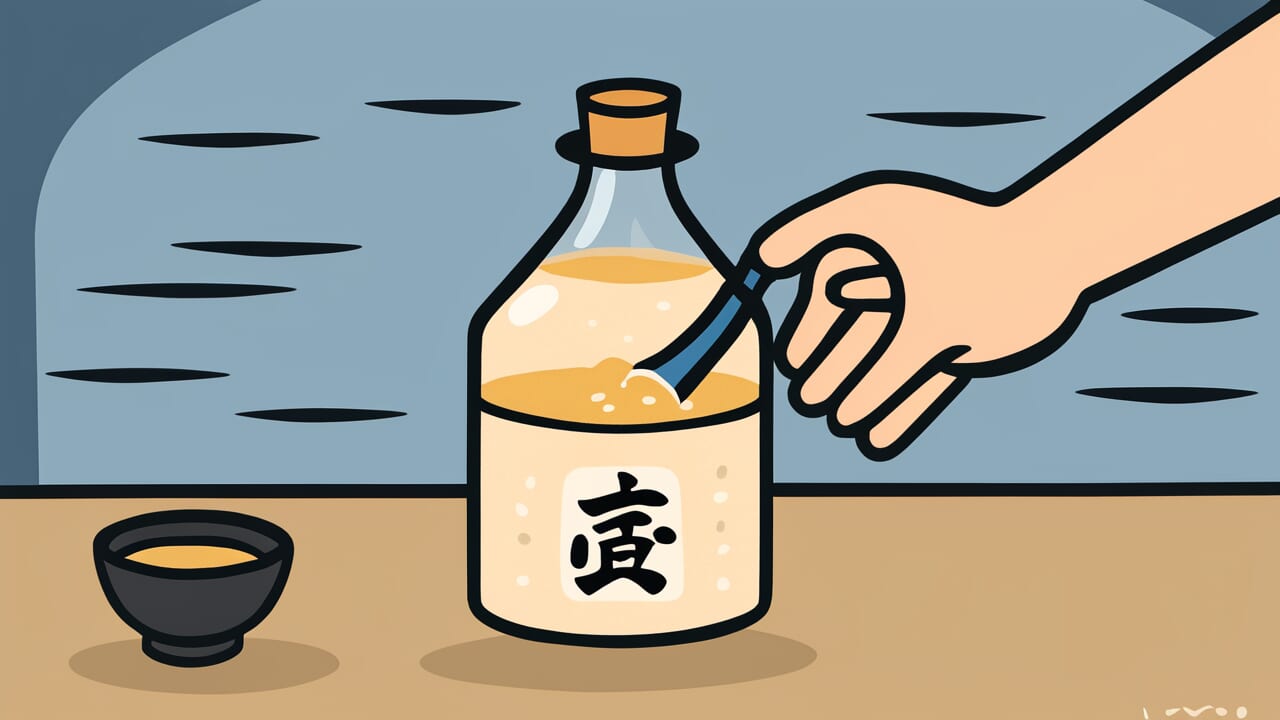How to Read “You can’t put two sho into a one-sho bottle”
いっしょうどっくりににしょうははいらぬ
Meaning of “You can’t put two sho into a one-sho bottle”
This proverb means that abilities and capacities have limits. You cannot exceed what you’re naturally capable of.
Just as it’s physically impossible to put two sho into a bottle that only holds one sho, humans also have natural limits to their abilities.
Pushing beyond these limits won’t bring good results.
People use this saying when someone tries to take on work beyond their abilities. It’s also used when someone sets unrealistic goals.
The proverb encourages people to face reality and reconsider their choices.
Today, this phrase doesn’t mean you should give up. Instead, it teaches the importance of understanding your abilities correctly.
You should do your best within a reasonable range.
Origin and Etymology
No clear written records exist about the origin of this proverb. However, based on its structure, it likely came from common people’s life experiences during the Edo period.
A one-sho bottle is a container made to hold one sho of sake. One sho equals about 1.8 liters.
During the Edo period, sake was familiar to common people. Bottles were everyday tools used regularly.
A one-sho bottle is literally made to hold one sho. Physically, you cannot put two sho into it.
If you try to force it in, the liquid will simply overflow.
This physical fact became a metaphor for human abilities and capacities. Just as containers have fixed volumes, people have natural abilities and limits.
Edo period people had the wisdom to express life lessons clearly. They used concrete, familiar objects from daily life.
By using a sake bottle that everyone knew, they could explain difficult philosophical concepts. Anyone could understand the message.
This expression method represents the crystallized wisdom of Edo common people. It was rooted in their real, everyday lives.
Usage Examples
- 彼は営業の才能はあるけど経営者には向いていない、一升徳利に二升は入らぬというからね
- 一升徳利に二升は入らぬというし、自分の能力に見合った仕事を選ぶことにしたよ
Universal Wisdom
This proverb has been passed down for generations because it contains deep insight into universal human nature.
Everyone has a psychological tendency to deny their own limits. We think we should be able to do more and aim higher.
The impulse to challenge ourselves beyond our capacity shows ambition. However, it can sometimes lead to self-destruction.
Our ancestors understood this human tendency well. If you overreach and stretch yourself too thin, you’ll eventually fail.
You’ll also cause trouble for those around you. It’s far more valuable to know your capacity correctly and do your best within that range.
What’s interesting is that this proverb doesn’t teach “giving up.” Instead, it emphasizes the importance of “self-awareness.”
A one-sho bottle only holds one sho. But filling that one sho completely has great meaning.
Knowing your capacity isn’t a passive attitude. Rather, it’s a realistic and wise way to live.
In life, accepting your limits takes courage. But that courage becomes the first step toward true growth.
This proverb shows us the essential human struggle and the path to resolving it.
When AI Hears This
Claude Shannon, the founder of information theory, mathematically proved something important. No matter how good your compression technique is, there’s a limit to how much you can compress information without losing it.
This is called “information entropy.” For example, you cannot compress a random sequence of numbers.
Every digit is unpredictable, and all of it is essential information. On the other hand, text with repeating characters can be compressed significantly.
The container limit shown in this proverb has the same structure as this principle. The “information capacity” of a one-sho bottle is fixed.
Within the absolute constraints of physical laws, no amount of ingenuity will fit two sho of liquid inside.
This corresponds to a concept in information compression called “Kolmogorov complexity.” It means the essential information content of an object cannot be compressed below a certain limit.
Modern data compression faces the same wall. If you ZIP a ZIP file again, it won’t get smaller.
This is because the redundancy has already been removed. The human brain works similarly.
A day has a capacity limit of 24 hours. Cutting sleep time doesn’t improve processing ability.
In fact, information processing efficiency drops, and the actual capacity decreases.
People in the Edo period didn’t know information theory. Yet they intuitively understood that systems have physical limits.
Optimization that ignores these limits will always fail.
Lessons for Today
Modern society is an era that demands “more, more” without limit. On social media, you see other people’s successes.
You might feel anxious that you need to become like them. However, this proverb teaches us something important.
You need to know your own capacity and have the courage to accept it.
You have your own unique capacity. It’s different from everyone else’s and belongs only to you.
If you focus on filling that capacity, you can continue sustainable growth. You won’t exhaust yourself by overreaching unnecessarily.
Specifically, identify your strengths and focus your energy there. Don’t try to do everything perfectly.
Choose the areas where you can truly create value. This isn’t running away—it’s a smart strategy.
What matters is this: a one-sho bottle fulfills its role perfectly by holding one sho. Similarly, you are valuable enough just by filling your own capacity.
Knowing your limits is the first step to living authentically as yourself.



Comments